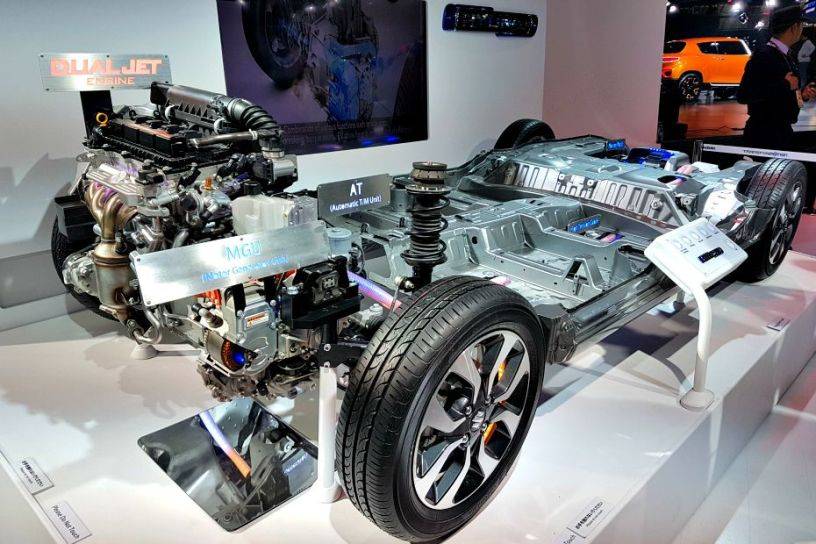New Swift’s Hybrid Powertrain Shown At Auto Expo 2018
Modified On Feb 13, 2018 10:46 AM By Raunak
- Write a comment
Maruti Suzuki will soon introduce strong hybrids in India. Here's how it will benefit us.

Apart from launching the third-gen Swift in the Indian market, Maruti Suzuki has also showcased the Swift Hybrid’s (sold in Japan) powertrain at Auto Expo 2018. The powertrain incorporates a 1.2-litre, naturally-aspirated petrol engine mated to a driving motor (MGU: motor generator unit) and features a 5-speed AMT (automated-manual transmission). The electric motor is powered by a 100V lithium-ion battery pack situated where one would normally find the spare tyre.
We'll soon see a spurt in strong hybrid cars coming our way in early 2020s and that will be the first real step towards electrification of cars in India. The strong hybrid cars will be significantly more fuel efficient than their petrol counterparts. So, for example, whereas a Swift petrol returns a claimed fuel efficiency of 22kmpl, expect its hybrid version to return in 30s. The diesel Swift's claimed FE figure stands at 28.4kmpl, for reference. Strong hybrids will also be costlier than petrol cars but with BSVI norms coming in 2020, the price gap between diesel-powered cars and strong hybrids will narrow leading more acceptability of hybrid powertrain.

Maruti Suzuki showcased the hybrid setup with a 1.2-litre, naturally-aspirated petrol engine (K12C) that features Suzuki’s Dual-Jet (twin injectors per cylinder and better overall thermal efficiency) technology, which is not yet available in India. The engine is slightly more powerful when compared to the one sold here thanks to the added tech. It puts out 91PS and 118Nm compared to the 83PS and 113Nm of the 1.2-litre K12B engine sold in India.

The electric motor, on the other hand, is rated at 13.6PS and 30Nm. The hybrid setup is mated to a 5-speed AMT (automated-manual transmission) or AGS (Auto Gear Shift) as Suzuki likes to call it. The AMT unit also features paddle shifters in the Swift Hybrid. In Japan, it returns an impressive certified fuel efficiency of 32kmpl. While the India-spec Swift petrol weighs up to 880kg, the Swift Hybrid is a bit heavier at 960kg. However, it is still lighter than the range-topping Swift diesel sold in India, which weighs 985kg.

Although Maruti Suzuki hasn’t confirmed the launch of the hybrid powertrain in the Indian market, there’s a fair chance that it will be introduced here since Suzuki is currently working on setting up a lithium-ion battery plant in Gujarat. This lithium-ion facility, which will be operational by 2020, will produce battery packs for the domestic as well as export markets.
The Maruti Suzuki Ciaz diesel was the first vehicle to introduce engine start-stop and mild electric motor assist in the mid-size sedan segment. The launch of the Swift Hybrid along with locally-produced batteries will let the Indo-Japanese carmaker step up its game when the country in on the brink of moving to cleaner emissions and efficient engines.
Check out: 2018 Maruti Suzuki Swift: First Drive Review
Read More on : Swift 2018 AMT















